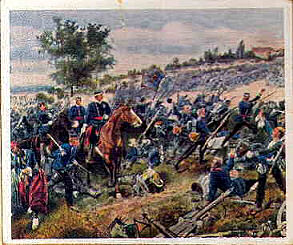Following text excerpted from Ferdinand Mock's obituary in the Sept. 10, 1915 Waconia Patriot
Ferdinand Mock was born in Gossmans Dorf, Bayern, Germany, on January 31, 1845, and received the best education in the schools of his community. His father was the proprietor of a cobbler shop where, after school, Ferdinand would spend hours learning the shoemaker trade.
When a young man he joined the German army, becoming a member of the 3rd Baierischer Yaeger regiment, and by true patriotism was advanced to one of the officers of his company. His company took an important part in the battle of Woerth* on August 6th, 1870, when the French and Germans fought a bloody battle. After this battle Mr. Mock was awarded a medal of honor which he has worn ever since.
 |
| Württemberg troops attack at Woerth |
Almost a month later or on September 1st, his regiment was again in the thick of the fray in the battle of Sedan. It was a fierce battle and thousands of men were lost on both sides. He fought gallantly side by side with the rich man and the poor man, men falling mortally wounded all around him. It was a decisive battle in which the French military power was destroyed and the western Germany frontier was rendered secure and the German empire established.
Soon after the latter incident in his life Mr. Mock was taken sick with typhoid fever and lay in the German military hospital for over a month, when he was honorably discharged.
In the year of 1873 he emigrated to this country stopping at St. Paul with a party of friends of his childhood days. In this party was also Miss Maragetha Kolb. They became closely attached, their friendship growing to love and they were married at Waconia on October 4th, 1873.
For about four months he labored among farmers, clearing the brush, falling trees and building roads, and assisted in laying out the townsite of the present village of Waconia. For these labors he received a few dollars with which he purchased some leather and a few tools and opened the first shoe repair shop in Carver county. As the business grew he added a light stock of shoes, increasing as did the trade until he had established one of the finest and well stocked exclusive shoe stores in this part of the country. He remained active in business until about fifteen years ago [circa. 1900] when he retired because of his hearing being affected.
* From Wikipedia:
The Battle of Wörth, also known as the Battle of Reichshoffen or as the Battle of Fröschweiler, should more correctly be called the second battle of Wörth, as the first one occurred on 23 December 1793. This second battle of Wörth took place on 6 August 1870 in the opening stages of the Franco-Prussian War. Troops from Germany commanded by Crown Prince Frederick and directed by his Chief of Staff, General Leonhard Graf von Blumenthal, defeated the French under Marshal Mac-Mahon near the village of Wörth in Alsace, on the Sauer, 10 km north of Haguenau.
The Battle of Wörth, also known as the Battle of Reichshoffen or as the Battle of Fröschweiler, should more correctly be called the second battle of Wörth, as the first one occurred on 23 December 1793. This second battle of Wörth took place on 6 August 1870 in the opening stages of the Franco-Prussian War. Troops from Germany commanded by Crown Prince Frederick and directed by his Chief of Staff, General Leonhard Graf von Blumenthal, defeated the French under Marshal Mac-Mahon near the village of Wörth in Alsace, on the Sauer, 10 km north of Haguenau.
See entire obituary:


No comments:
Post a Comment